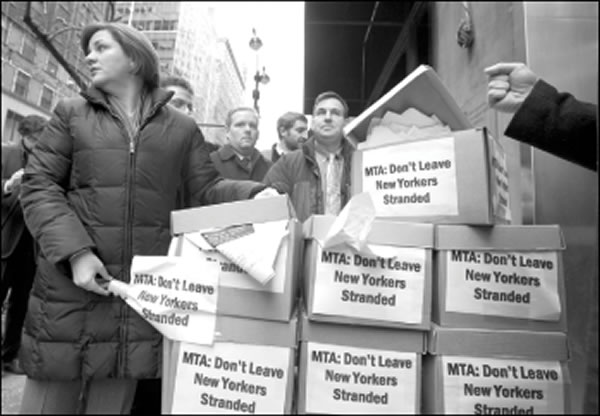By Albert Amateau
City Council Speaker Christine Quinn delivered a petition with 40,000 signatures to the Metropolitan Transportation Authority’s headquarters on Tuesday, protesting proposed cuts in bus and subway service, the phasing out of student MetroCards and reductions in Access-A-Ride service for seniors and disabled citizens in the coming fiscal year.
Together with James Vacca, the Council’s Transportation Committee chairperson, and leaders of transit advocacy groups, Quinn urged commuters to attend M.T.A. public hearings this week to protest the cuts, which are proposed to make up for the agency’s $740 million shortfall from the loss of tax revenue and state funding due to the depressed economy.
The only hearing in Manhattan will start at 6 p.m. Thurs., March 4, at the Haft Auditorium at Fashion Institute of Technology, Seventh Ave. and 27th St. Doors will open at 4:30 p.m., when the public is invited to ask questions of M.T.A. staff members at the registration tables.
“These 40,000 petitions represent just a microcosm of commuters that oppose these severe cuts, which New York City Transit President Tom Prendergast himself described as the worst he has seen in 35 years,” Quinn said.
Paul Steely White, of Transportation Alternatives, Gene Russianoff, of the Straphangers Campaign, and Bobbie Sackman, of the Council of Senior Centers and Services, helped deliver the petition to M.T.A. headquarters, at 347 Madison Ave.
Members of WE ACT (West Harlem Action for Environmental Justice), Tri-State Transportation Campaign and UPROSE/Students for Transportation Justice were also on hand at the M.T.A. headquarters.
The proposed cuts to Manhattan bus service include elimination of overnight and weekend service on the M8, the Eighth St. crosstown bus. The M21 Houston St. crosstown bus, the M9 Avenue B bus and the M6 bus on lower Broadway would also reduce service.
The full-fare student MetroCard would be reduced to half-fare this year, and in 2011 there would be no reduced student fare at all.
Access-A-Ride service would replace door-to-door service with feeder service to central points, and Access-A-Ride eligibility for some riders would become more restrictive, changing from seasonal to trip-by-trip weather conditions.
The W and M subway lines would be eliminated, and service would be reduced on a dozen other subway lines and more than 40 other local and express bus routes.
“There is something wrong,” Vacca said, “when an agency is willing to go ahead with a plan that is so clearly flawed, where students would get cut off from the schools of their choice and millions of riders would experience more crowding, longer waits and reduced service over all.”
“These are the worst transit cuts I’ve seen in 30 years in fighting for subway and bus riders,” Russianoff said.
“The proposed cuts in Access-A-Ride could doom older New Yorkers to imprisonment in their homes,” said Sackman.
Quinn, Vacca and transit advocates are calling on the M.T.A. to avoid devastating service cuts by reallocating up to $140 million of federal stimulus funds and pay-as-you-go capital funding to the M.T.A. operating budget. That strategy, authorized by federal law, has already been implemented in Chicago, Atlanta and Seattle, Quinn and Vacca said.






































